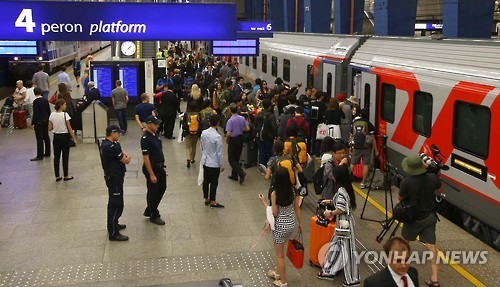An inter-continental express train meant to promote peace and unity across Eurasia arrived in Berlin Thursday, the final destination of its 14,400-kilometer journey.
On board were 206 participants selected from various backgrounds and professions, who had left Seoul on July 14 to take part in the 17-day rail journey across six countries, including China, Russia and Poland.
The Eurasia Express was conceived by the Park Geun-hye administration as part of its ambitious “Eurasia Initiative,” which aims to link energy and logistics infrastructure across Asia and Europe.
Critics have raised doubts about the success of the initiative, citing ongoing tensions with North Korea whose heavily fortified border with South Korea blocks any direct transportation link between the South and the rest of the Eurasian continent.
Travelers on the Eurasia Express had to fly to either Beijing or Vladivostok to board one of two trains before they combined in Irkutsk, Russia for the remainder of the journey through Moscow and Warsaw to Berlin.
Foreign Minister Yun Byung-se, who flew to Warsaw to join the last leg of the expedition, still voiced hope.
 |
| (Yonhap) |
“The Eurasia Express was not a simple journey but one carrying the past, the present and the future, and we were able to share a message of communication, harmony, reconciliation, peace and hope with our Eurasian neighbors,” he said upon arriving at a train station in Berlin around 8 p.m.
“I hope our desire for peace and prosperity in Eurasia and Korean reunification will reach Berlin’s skies through the finale event tomorrow.”
South Korea has organized a 2-kilometer march in Berlin and a debate between South Korean and German college students to raise public awareness of its wish for inter-Korean unification.
On the train from Warsaw, Yun met with a group of South Korean university students on the expedition.
“If our railways are linked, it would take only two to three hours to go from Seoul to Pyongyang” he said as he spoke with them in a small cabin.
He cited the example of the former East and West Germany, saying German reunification happened sooner due in part to their continued exchanges by rail over some 20 to 30 years.
“South and North Korea have deep mistrust of each other due to their division and military confrontation, and there is anxiety about our freight and our people’s safety,” he said. “There has to be a guarantee and a basic agreement on this. Dialogue between the South and the North must continue and be held properly.”
Before boarding the train, Yun paid a courtesy call on Polish President-elect Andrzei Duda in Warsaw. During their meeting, the two sides discussed ways to strengthen ties in defense and other sectors as well as on the global stage, officials said. (Yonhap)

